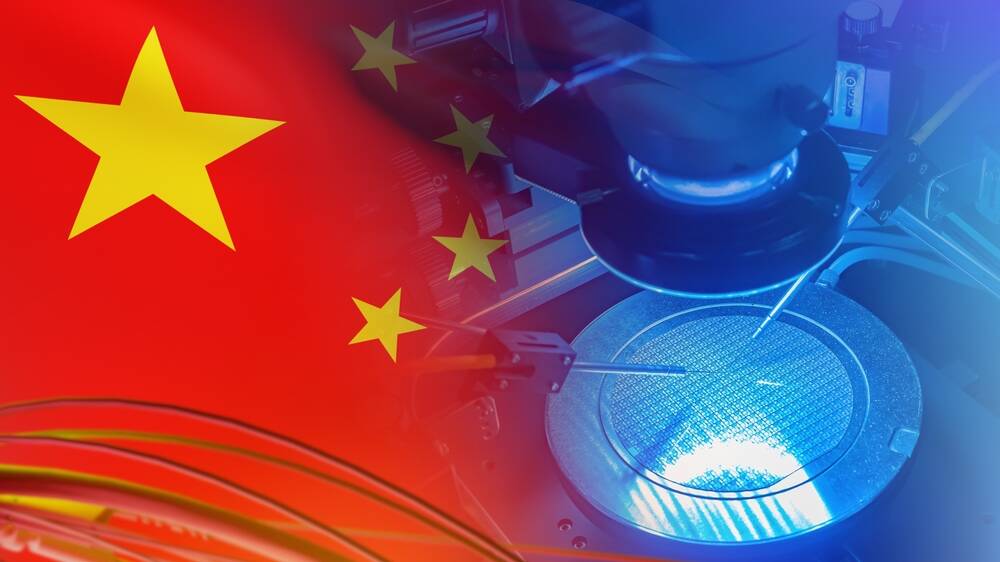Sales Bonanza At ASML As China Stockpiles Chipmaking Kit

China is hurrying to buy as much chipmaking equipment as it can before further export restrictions shut off supply, boosting the country's imports from the Netherlands, home to photolithography maker ASML.
The US Department of Commerce issued updated restrictions last month on the export of advanced chips and chipmaking equipment to China.
At the time, ASML said more of its products would fall under the new rules. The company has already operated for several years under restrictions covering its most advanced equipment using extreme ultraviolet (EUV) wavelengths, and an agreement between the US, Japan, and the Netherlands earlier this year extended this to cover some of its deep ultraviolet (DUV) lithography machines as well.
However, ASML said the Dutch authorities had issued it with licenses to keep selling the machines to China through to the end of this year, after which it would have to halt sales.
"Our customers are aware of the export control regulations, so, they know that as of January 1, 2024, it is unlikely we will receive export licenses for these systems for shipment to domestic Chinese customers," an ASML spokesperson told The Register.
These are understood to be the NXT:2000i series, which can be used in the manufacture of 7nm chips.
One effect of the new restrictions has been to accelerate the stockpiling of chipmaking equipment before any further sanctions might be announced. According to the South China Morning Post, Chinese imports from the Netherlands "soared" in October following Washington's updated restrictions.
The latest Chinese customs data shows that shipments from the Netherlands to China rose by 29.5 percent compared with a year earlier, it claimed, despite a general fall off in trade between the EU and China.
This follows an earlier report from the Financial Times, which found that China's imports of chipmaking tools in June and July of this year reached nearly $5 billion, said to be up 70 percent on the same period a year earlier.
- Ex-ASML worker accused of stealing chipmaking secrets for China is Huawei to a new job
- Canon claims its nanoimprint litho machines capable of 5nm chip production
- Intel starts mass production on Intel 4 node using EUV in Irish fab
- Chinese meme-makers crown US Commerce Secretary as Huawei brand ambassador
A senior economist at the Centre for European Reform attributed the rise in Chinese imports from the Netherlands to "Beijing's buying spree of Dutch chip machinery before the drawbridge gets pulled up."
Dutch politician Dilan Yeşilgöz-Zegerius, leader of the VVD party, said recently the Netherlands should have acted earlier to limit the export of chipmaking machines to China, according to Bloomberg.
Meanwhile, Canon is hoping to take advantage of the restrictions to steal some market share from ASML. The company's nanoimprint lithography machines, announced last month, can be used to produce 5nm chips and are claimed to be less costly than ASML's kit.
Tokyo's chipmaking export restrictions, announced along with those of the US and the Netherlands, are understood to not explicitly block nanoimprint lithography. Canon seems hopeful that it may be able to sell these to China as a result.
Such loopholes might be closed off before long. In the US, Nvidia received notice from the US government that the latest rules dictating the sale of its AI accelerator products to China were "effective immediately," despite being slated to come into effect after 30 days. This may have been in response to Chinese customers reportedly ramping up purchases of GPUs ahead of the expected new restrictions. ®
From Chip War To Cloud War: The Next Frontier In Global Tech Competition
The global chip war, characterized by intense competition among nations and corporations for supremacy in semiconductor ... Read more
The High Stakes Of Tech Regulation: Security Risks And Market Dynamics
The influence of tech giants in the global economy continues to grow, raising crucial questions about how to balance sec... Read more
The Tyranny Of Instagram Interiors: Why It's Time To Break Free From Algorithm-Driven Aesthetics
Instagram has become a dominant force in shaping interior design trends, offering a seemingly endless stream of inspirat... Read more
The Data Crunch In AI: Strategies For Sustainability
Exploring solutions to the imminent exhaustion of internet data for AI training.As the artificial intelligence (AI) indu... Read more
Google Abandons Four-Year Effort To Remove Cookies From Chrome Browser
After four years of dedicated effort, Google has decided to abandon its plan to remove third-party cookies from its Chro... Read more
LinkedIn Embraces AI And Gamification To Drive User Engagement And Revenue
In an effort to tackle slowing revenue growth and enhance user engagement, LinkedIn is turning to artificial intelligenc... Read more

